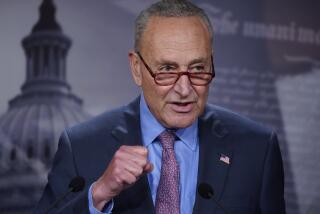Democrats plan more moves to aid jobless
WASHINGTON — They won’t be called stimulus. And they won’t cost anything close to $787 billion. House leaders plan to press for new measures aimed at creating jobs and maintaining a safety net for the unemployed in hopes of preventing a still-fragile economy from lapsing back into recession, House Speaker Nancy Pelosi said Wednesday.
“It is not the plan to put it all in a bill and move forward. Because we do not have plans for an additional stimulus package,” Pelosi (D-San Francisco) told reporters. “We do have plans to stimulate the economy in the work that we are doing.”
Pelosi’s remarks, which came after a four-hour meeting in which House leaders sought advice from a team of economists, underscore the queasy politics of righting the economy. With budget deficits rising along with the jobless rate, Democrats face the uncomfortable choice of doing nothing heading into next year’s midterm elections or digging an even deeper budget hole.
Republicans, seeing a political opening, say the talks prove that President Obama’s first attempt at stimulating the economy, a $787-billion package of tax cuts and public spending enacted in February, was a failure. But the five ideologically diverse economists Pelosi summoned to Washington on Wednesday said that’s not true. Combined with the Bush administration’s $700-billion bank bailout and actions by the Federal Reserve, Obama’s stimulus package successfully halted the economy’s slide toward the abyss, the economists said.
But with the unemployment rate at 9.8% and rising, Mark Zandi, chief economist for Moody’s Economy.com, said that “the possibilities of the economy slipping back into recession next year remains uncomfortably high.” That makes it “very important for policymakers to remain aggressive and continue to do more,” said Zandi, who advised the presidential campaign of Republican Sen. John McCain of Arizona.
“We’ve avoided a great depression. But we are still at risk of a great stagnation,” said meeting participant Robert Kuttner, co-founder of the liberal American Prospect magazine. “Just about everyone in that room feels that there needs to be more stimulus, and not after the State of the Union [address], but very soon.”
Pelosi said the ideas under discussion included extending a number of expiring provisions from the earlier stimulus. The House has already voted to extend unemployment benefits, a measure that has been hung up in the Senate. Democrats are also looking at extending health benefits for the unemployed, higher loan limits for federally backed mortgages and a tax credit for first-time home buyers that could be offered to “any-time homeowners,” Pelosi said.
Pelosi said House Appropriations Committee Chairman David R. Obey (D-Wis.) presented her with “an array” of other spending ideas Tuesday night, and that House Transportation and Infrastructure Committee Chairman James L. Oberstar (D-Minn.) is pushing for more spending on infrastructure. Democrats are also considering tax breaks for businesses that save or create jobs.
The economists offered other ideas, including additional aid for cash-strapped states that could be forced to cut jobs or raise taxes in the face of state budget deficits expected to total $350 billion over the next three years. They also called on lawmakers to divert unused and repaid money from the bank bailout to recapitalize community banks, reinvigorate lending to small businesses and provide additional help to homeowners facing foreclosure.
However, the economists cautioned that lawmakers also must quickly begin to chart a course to bring annual budget deficits back into a sustainable range over the next decade. The deficit was $1.4 trillion in the year just ended, and congressional budget analysts predict it will break into the same territory in the year to come.
Legislation to extend unemployment benefits is stalled in the Senate in a partisan dispute over how to finance the plan, among other issues.
Republicans have been blocking the measure, which would extend benefits by as much as 20 weeks, because they want votes on several amendments, including on how to pay for the $2.4-billion measure. Democrats plan to finance the aid by extending an employer payroll surtax due to expire at the end of this year.
Senate Majority Leader Harry Reid, a Nevada Democrat, late Wednesday took the first procedural steps aimed at forcing a vote on the bill.
“We have wanted to do this for weeks and they won’t let us,” Reid said Tuesday.
“We talk about doing something for economic recovery, to stimulate the economy. Who is going to spend the money more quickly than somebody who is out of a job, doesn’t have income?”
--
Bloomberg News was used in compiling this report.
More to Read
Get the L.A. Times Politics newsletter
Deeply reported insights into legislation, politics and policy from Sacramento, Washington and beyond. In your inbox three times per week.
You may occasionally receive promotional content from the Los Angeles Times.










